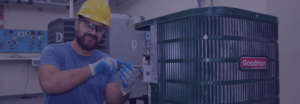The HVAC industry is thriving with new challenges, evolution, and opportunities. If you are thinking of starting a career as an HVAC technician, attending an air conditioning and refrigeration school and staying updated with the latest industry trends proves to be rewarding.
Content:
Do you want to start your career as an HVAC technician? What are the essential things to keep in mind? First: attending an air conditioning and refrigeration school to earn a diploma or associate degree. Second: stay updated on the latest HVAC industry trends to grow and excel in your career.
Let us explore the top HVAC industry trends!
The HVAC Industry employs thousands and hundreds of people nationwide and is rapidly growing. The advancement of HVAC technology and systems are rolling out now and then!
New challenges and higher demands are arising in the HVAC industry that requires intelligent and skilled technicians. To join the thriving HVAC industry, you should get the best education and keep an eye on the latest trends.
Smart Systems:
The HVAC systems are advancing quickly to ensure consumers’ comfort. Consumers are often seeking to install smart HVAC equipment and systems. Most advanced HVAC units can be managed by apps, which offer comfort to the consumers. Manufacturers are consistently bringing up innovative HVAC systems into the market. It requires the HVAC technicians to keep up with current technology to meet the need, demand, and expectations.
Commercial Automation:
Commercial building owners are looking for HVAC solutions that help them to perform building management effectively and efficiently. HVAC manufacturers work to provide consumers with remotely managed and controlled systems. The HVAC technicians need to know how to use and troubleshoot the advanced commercial systems to remain competitive in today’s market.
Go Green Technologies:
Energy-efficient systems are in demand among many homeowners and commercial property owners. Customers are looking for new ways to stay environmentally friendly and energy-efficient. The HVAC industry is influenced by new sustainable demands and is ready to provide clean solutions with advanced technologies. The candidates entering the workforce as HVAC technicians need to be efficient in handling the advanced green technologies in the market.
Company Culture:
Company culture is essential to business results, which every worker should be aware of. With huge growth in the HVAC industry expected, many technicians are going to join the workforce. To make your mark and get the most out of the plenty of new opportunities, you should learn about the company culture and learn to adapt to it. How does the work environment affect your ability to perform? What does a technician should involve in teamwork and get the job done well? There are many things to learn and be aware of for becoming a valuable and efficient HVAC technician.
New Safety Measures:
The HVAC industry has no doubt a bright future and proves to be a rewarding career. As an HVAC technician, you should be aware of the changing rules and regulations of the respective industry. It helps you to ensure safety for you, the employer, and the consumer. HVAC technicians should give priority to safety measures and precautions. It helps during essential HVAC system repair and service to ensure the job is done well and safely.
Conclusion:
In the HVAC industry, growth means rewarding job opportunities and the introduction of new technological advances. The new era is all about bringing in sustainability, lowering utility bills, using advanced energy-efficient systems, and innovative training for individuals entering the HVAC industry.
At an air conditioning and refrigeration school, you enroll in an HVAC training program to acquire the essential skills and get the education. A training program prepares you to get started with a rewarding career in the HVAC industry.
About the Author:
This article is written by CBT College– a school of construction, which offers HVAC training programs. If you want to contact an air conditioning and refrigeration school, like CBT College, give them a call today at 786-724-1478 or fill this form https://www.cbt.edu/request-info/ to get more information about their A/C and refrigeration training programs.






